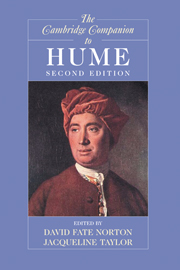Book contents
- Frontmatter
- 1 An Introduction to Hume’s Thought
- 2 Hume’s New Science of the Mind
- 3 Hume and the Mechanics of Mind: Impressions, Ideas, and Association
- 4 Hume’s Theory of Space and Time in Its Skeptical Context
- 5 Hume on Causation
- 6 Hume and the Problem of Personal Identity
- 7 Hume’s Skepticism
- 8 Hume’s Moral Psychology
- 9 The Foundations of Morality in Hume’s Treatise
- 10 Hume’s Later Moral Philosophy
- 11 The Structure of Hume’s Political Theory
- 12 Hume’s Principles of Political Economy
- 13 Hume on the Arts and “The Standard of Taste”: Texts and Contexts
- 14 David Hume: “The Historian”
- 15 Hume on Religion
- Appendix: Hume’s Autobiographies
- Selected Bibliography
- Index
- Series List
7 - Hume’s Skepticism
Published online by Cambridge University Press: 28 May 2009
- Frontmatter
- 1 An Introduction to Hume’s Thought
- 2 Hume’s New Science of the Mind
- 3 Hume and the Mechanics of Mind: Impressions, Ideas, and Association
- 4 Hume’s Theory of Space and Time in Its Skeptical Context
- 5 Hume on Causation
- 6 Hume and the Problem of Personal Identity
- 7 Hume’s Skepticism
- 8 Hume’s Moral Psychology
- 9 The Foundations of Morality in Hume’s Treatise
- 10 Hume’s Later Moral Philosophy
- 11 The Structure of Hume’s Political Theory
- 12 Hume’s Principles of Political Economy
- 13 Hume on the Arts and “The Standard of Taste”: Texts and Contexts
- 14 David Hume: “The Historian”
- 15 Hume on Religion
- Appendix: Hume’s Autobiographies
- Selected Bibliography
- Index
- Series List
Summary
By all that has been said the reader will easily perceive, that the philosophy contained in this book is very sceptical, and tends to give us a notion of the imperfections and narrow limits of human understanding. Almost all reasoning is there reduced to experience; and the belief, which attends experience, is explained to be nothing but a peculiar sentiment, or lively conception produced by habit. Nor is this all. When we believe any thing of external existence, or suppose an object to exist a moment after it is no longer perceived, this belief is nothing but a sentiment of the same kind. Our author insists upon several other sceptical topics; and upon the whole concludes, that we assent to our faculties, and employ our reason only because we cannot help it. Philosophy would render us entirely Pyrrhonian, were not nature too strong for it.
A 27The above passage comes from a pamphlet written by David Hume to secure a readership for his largely unappreciated Treatise of Human Nature. Although not successful in this regard, the Abstract remains a valuable guide to Hume's Treatise, through offering his own assessment of the significance of that work. Here, at least, Hume is unequivocal in describing his philosophy as “very sceptical.” But even if Hume describes his philosophy in this way, and even if, at the time, his philosophy was almost universally taken in this light, it remains unclear, first, what this skepticism amounts to and, second, how this skepticism is related to other aspects of his philosophical program.
- Type
- Chapter
- Information
- The Cambridge Companion to Hume , pp. 209 - 237Publisher: Cambridge University PressPrint publication year: 2008
- 2
- Cited by

